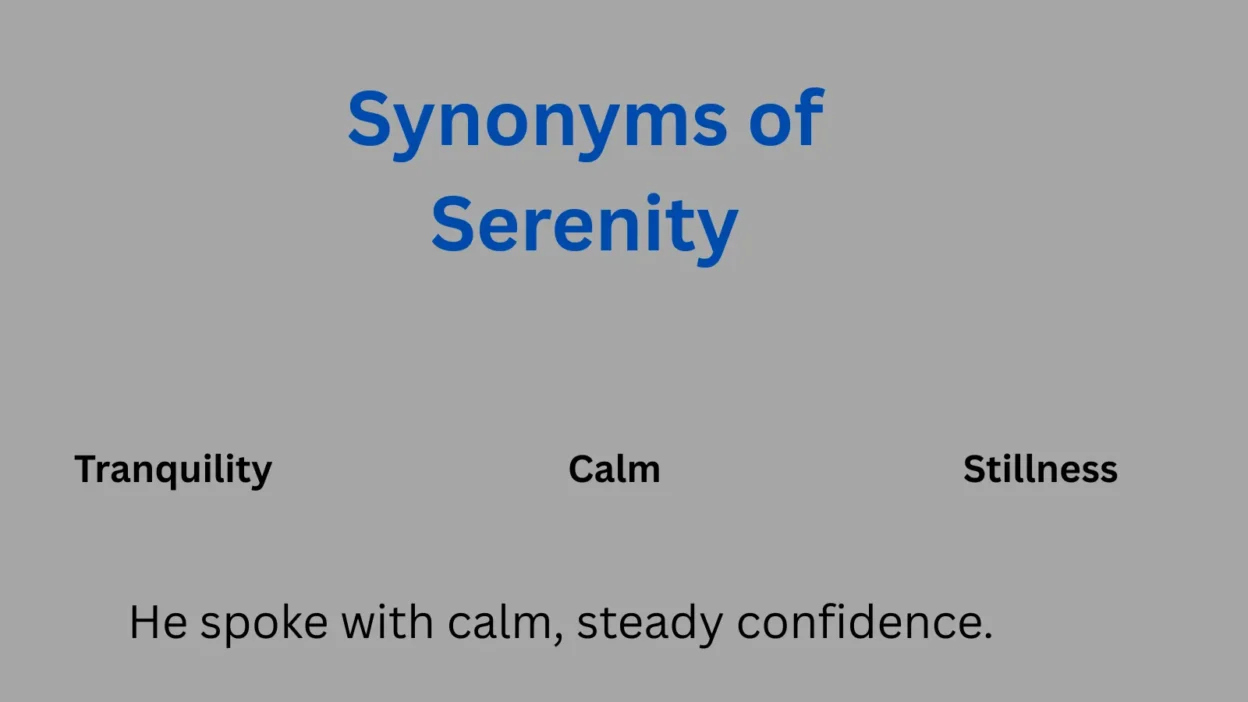Looking for the perfect words to express calm, peace, or inner stillness? These powerful synonyms of serenity might be exactly what your writing needs. Serenity is one of those beautiful words that captures a deep sense of inner peace, calm, and quiet strength. It’s more than just the absence of noise or chaos—it’s a state of mind, a graceful stillness that brings emotional balance. People often associate serenity with peaceful landscapes, meditative moments, or a person who radiates calm energy even in turbulent times.
But in writing or conversation, using “serenity” over and over can get repetitive. That’s where synonyms come in. The English language offers a rich pool of alternatives, each carrying its shade of tranquility.
In this article, we’ll explore 30 carefully selected synonyms of serenity, explain their subtle differences, and help you know when and how to use them based on the tone or context you’re aiming for.
Understanding the Nuances of Serenity
Before diving into the synonyms, let’s understand the essence of serenity:
- It often conveys emotional calm, mental clarity, and an untroubled state.
- It is used in both internal/emotional contexts (e.g., inner serenity) and external settings (e.g., a serene landscape).
- It has a soft, reflective quality, suggesting acceptance, peacefulness, and equanimity.
Depending on what you’re describing—a mood, a person, a setting, or even a moment in time—you’ll want to choose a synonym that matches the emotional weight and tone of your message.
Synonyms of Serenity – With Meanings & Usage
1. Tranquility
When to use: For peaceful environments or calm emotions.
Example: The lake’s early morning tranquility was breathtaking.
2. Peacefulness
When to use: To describe a general sense of calm or lack of conflict.
Example: She radiated peacefulness, even during the meeting’s chaos.
3. Calm
When to use: In both emotional and physical contexts; very flexible.
Example: He spoke with calm, steady confidence.
4. Stillness
When to use: To emphasize the absence of motion or sound.
Example: A sacred stillness filled the chapel.
5. Composure
When to use: Best used for someone maintaining control under pressure.
Example: Despite the bad news, she kept her composure.
6. Equanimity
When to use: Refers to mental steadiness, especially in difficulty.
Example: He faced the criticism with remarkable equanimity.
7. Harmony
When to use: For emotional alignment or smooth relationships.
Example: They lived in perfect harmony with nature.
8. Placidness
When to use: For describing an undisturbed or mild state.
Example: Her placidness was comforting during the storm.
9. Repose
When to use: Often literary, evoking rest or peace.
Example: The statue lay in eternal repose.
10. Quietude
When to use: An elegant or poetic word for deep quietness.
Example: He longed for the quietude of the countryside.
11. Zen
When to use: For mindful, meditative calm; modern tone.
Example: She reached a zen-like state while painting.
12. Mellowness
When to use: For relaxed, pleasant calm with warmth.
Example: His mellowness made him easy to talk to.
13. Contentment
When to use: Emotional fulfillment or satisfaction.
Example: She smiled with quiet contentment.
14. Still
When to use: Poetic or descriptive usage of complete calm.
Example: The forest was still after the snowfall.
15. Silence
When to use: Highlights lack of sound, often emotionally loaded.
Example: A heavy silence hung between them.
16. Pacification
When to use: For calming after conflict.
Example: The leader’s speech brought pacification to the crowd.
17. Balance
When to use: Refers to emotional or life equilibrium.
Example: Meditation helped her regain balance.
18. Lull
When to use: Temporary calm in activity.
Example: There was a lull in the conversation.
19. Peace of mind
When to use: Emotional or psychological calm.
Example: Knowing her family was safe gave her peace of mind.
20. Relaxation
When to use: Best for casual or leisure contexts.
Example: Vacation brought her much-needed relaxation.
21. Ease
When to use: Comfort without strain or stress.
Example: He moved with the ease of someone at home.
22. Respite
When to use: Temporary break from stress or pain.
Example: The afternoon nap was a welcome respite.
23. Patience
When to use: Calm endurance, especially during delay.
Example: She waited with the serenity of patience.
24. Poise
When to use: Calm grace under pressure or attention.
Example: She handled the audience with poise.
25. Unflappability
When to use: Slangy or humorous calm in stress.
Example: His unflappability in emergencies was legendary.
26. Detachment
When to use: Emotionally neutral, serene in conflict.
Example: She viewed the situation with detached serenity.
27. Solace
When to use: Peace found in comfort or consolation.
Example: Nature offered him solace after the loss.
28. Flow
When to use: Calm focus in activity or creativity.
Example: She entered a flow state while sculpting.
29. Restfulness
When to use: Relaxing or soothing atmosphere.
Example: The spa’s restfulness was exactly what she needed.
30. Hush
When to use: Sudden or imposed quietness; often poetic.
Example: A hush fell over the room.
How to Choose the Right Synonym of Serenity
Different emotional tones call for different words. Here’s a quick guide to help:
- Describing a place? Go with: tranquility, stillness, quietude, restfulness.
- Talking about a person’s temperament? Choose: composure, equanimity, poise, calm.
- Referring to a state of mind? Use: peace of mind, contentment, zen, flow.
- Need a poetic or literary tone? Opt for: repose, hush, silence, quietude.
- Seeking a casual tone? Go with: relaxation, mellowness, ease.
Also, consider cultural tone:
- Words like zen or flow feel modern and mindful.
- Equanimity or detachment feels formal or philosophical.
- Stillness and hush evoke more emotional or dramatic imagery.
Conclusion: Embracing the Language of Calm
Serenity is a powerful feeling, and choosing the right synonym allows you to express it in richer, more meaningful ways. Whether you’re writing poetry, journaling your thoughts, or describing a scenic view, understanding the subtle differences among these 30 alternatives helps you communicate with more emotional precision and clarity.
So next time you’re tempted to say something is “serene,” consider if tranquility, composure, or even zen might capture the moment better.
The more options you know, the more beautifully and accurately you can express the peace you see or feel.




